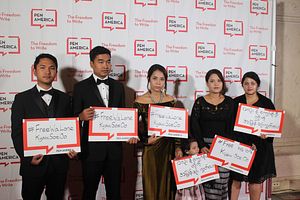If anything, the recipients of the PEN Freedom to Write Award have come to symbolize the decline of democratic progress throughout the world. This year’s awardees, imprisoned Reuters journalists Wa Lone and Kyaw Soe Oo, are no exception. Myanmar has dropped six places on the World Press Freedom Index to a staggering 137th out of 180 countries, in just one year.
At Tuesday’s PEN literary gala held at the American Museum of Natural History in New York, Margaret Atwood, author of the dystopian novel The Handmaid’s Tale, spoke on behalf of Wa Lone and Kyaw Soe Oo. The journalists had that same day attended yet another court hearing in Yangon. Atwood warned in her speech that silencing those who tell stories they dislike is the first thing authoritarians do when democracy is in retreat.
And in retreat it is. The case against Wa Lone and Kyaw Soe Oo is bound to drag on for several more months as the prosecution seeks to find evidence of alleged treachery. In line with Myanmar jurisprudence this fishing expedition recently led the judge to allow the submission of new “evidence” obtained from the journalists’ cell phones. It is not unusual for Myanmar prosecutors to either expand the scope of charges or to end up with, as with many land-grabbing trials, charges of “trespassing” if no other evidence can be found.
Even so, this trial has taken some unusual positive turns. The recent whistleblowing by police captain Moe Yan Naing testifying that the Reuters journalists were indeed framed caused quite a stir. The testimony later cost Moe Yan Naing’s family their housing and saw him sentenced to prison for breaching police discipline. Although the prosecution urged the judge to dismiss the testimony, the judge, in yet another surprising move, allowed it to stand.
International pressure has had little effect on curbing the Myanmar military or enticing the NLD government to intervene, especially after veteran U.S. diplomat Bill Richardson clashed with Aung San Suu Kyi. But being employed by an international media organization such as Reuters has so far safeguarded the journalists from another common form of extracting “evidence” in Myanmar, namely torture. Lahpai Gam, a Kachin farmer released in an amnesty push in April this year, served six years in prison after being accused of “unlawful association” with the ethnic Kachin Independence Army. The torture he suffered during interrogations ranged from waterboarding, burns, beatings, and rapes.
I recently talked to senior reporter Lawi Weng for The Irrawaddy, who also in June 2017 was charged with “unlawful association.” He and two colleagues had conducted interviews with the Ta’ang National Liberation Army in northern Shan state when they were arrested by the Burmese military. Section 17 of the Unlawful Association Act from 1908 has often been used to target political activists linked to ethnic armed groups. After two months in prison, the military surprisingly dropped the charges.
According to Lawi Weng, there were a few reasons for why his case, unlike Wa Lone and Kyaw Soe Oo’s, was dismissed. In late August 2017 the Arakan Rohingya Salvation Army (ARSA) attacked several police posts in northern Rakhine. The Burmese army was preparing a larger military operation and was keen on gaining public support and avoiding public criticism, hence the timing for “amnesty.” The majority public, who are Burmese Buddhists, has also been more forgiving when it comes to the struggle of ethnic groups vis-à-vis the situation of Rohingya Muslims.
Eaint Thiri Thu, who has worked for several news organizations including The New York Times, The Washington Post, and the BBC, has also noticed a shift in public opinion. As a student she was indoctrinated with an ideology advancing the idea of a united and homogeneous Myanmar,but not until recently has she observed that a real process of “Burmanization” has taken place, especially visible online and connected to the trial against the Reuters journalists.
The Burmese army has strategically increased their social media presence, and even respected members of the ruling party NLD have used their Facebook accounts to instigate hatred against the journalists who are considered by many to be traitors. If released, Wa Lone and Kyaw Soe Oo might face grave danger. Pulitzer Prize-winning journalist Esther Htusan had to flee Myanmar in November 2017 after severe threats to her life were made on social media.
Despite the fact that the story that Wa Lone and Kyaw Soe Oo were investigating when arrested is no longer a state secret, and that seven soldiers from the Myanmar army have been sentenced to 10 years in prison for the part they played in the massacre of Rohingya Muslims in Rakhine, the trial continues to drag on. There seems to be only three ways a case involving charges against the 1923 colonial-era Official Secrets Act can go. The president can refuse to sign the charges, which did not happen. The military prosecution can drop the charges, which is also unlikely, or amnesty can be given. A fourth way being of course that the journalists will have to serve the prison sentence in full, which in this case carries a maximum penalty of 14 years. As of now, one can only wait and see, a strategy all too familiar to the Burmese.
Sarah Schulman is a journalist, political scientist and Associate Fellow at the Swedish Institute of International Affairs. She is based in Yangon, Myanmar and New York, United States.

































